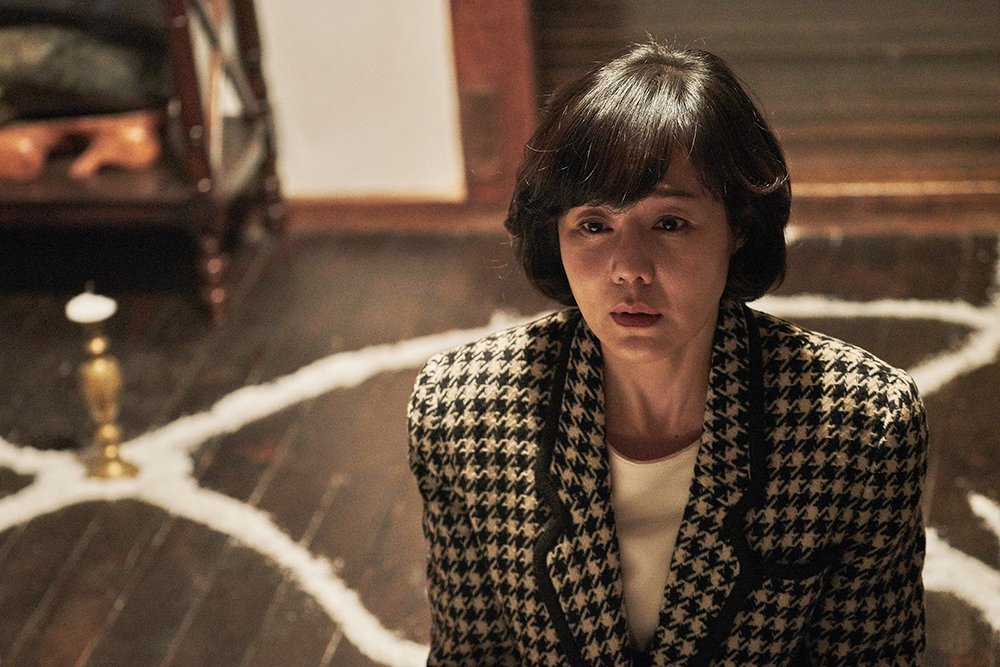
One aspect of filmmaking that will always interest me is how directors view/feel about their audience. From filming to editing to marketing, directors surely have a mindset as to how their participating watchers will feel during a particular scene, or sequence of buildup, or that sharp left that segues to the ending. There are filmmakers that truly care, filmmakers that feel their vision is more important than their audience, and even some filmmakers that truly couldn’t care less about what people think of their film. Then we have director Lim Dae-Woong and The House of the Disappeared, an uncommon-but-possible case where the filmmakers must have made it just to see the looks of complete disbelief on anyone that watches it.
The House of the Disappeared is a remake of the 2013 film The House at the End of Time from Venezuela. The opening scene shows Kang Mi-hee (Yunjin Kim from Lost) waking up in distress after realizing her head met the blunt end of a heavy mirror. After looking around the creep-filled house, she finds her husband stabbed to death, and her son standing in distress, only to be yanked into a dark room by an unknown force with the door slamming shut. In a montage we see Mi-hee gets arrested and convicted for the apparent murder of her whole family, and she spends twenty-five years in jail. Then she’s released, allowed to stay in her old home where she apparently slaughtered her family, and apparently allowed visits from an anxious priest (Taecyeon), and she starts getting visions of what really happened. Apparently.

I must admit, just describing all of that might have triggered a Category 2 headache (if we’re going by Twister categories, which I always do). If that synopsis doesn’t make sense to you, the film itself won’t be that much kinder as you watch. One thing I will say and think about that’ll lessen the pain is the ensemble performance given by literally everyone. Ranging from Kim’s impressive turn as a mother going through hell, all the way to secondary performances from background cops and shopkeepers, there isn’t anyone in this film that isn’t giving it their all. They do their best to be engaging: selling us on turns, revelations, and moments that are beyond absurd (more on that in a minute). Credit has to be given to Lim for directing his cast to perform as a single unit of positive sturdiness.

Having said that, I can feel the skull throbs pulsating again. Another reason why I admired the ensemble’s performance is that they had to downright elevate the material surrounding them. The House of the Disappeared isn’t too far off from the typical haunted house tropes. Loud noises, jump scare,s and children walking behind the protagonist via mirrors (where’s my sub-genre of creepy kids doing something creepy in the damn mirrors?) – it’s like a mini-buffet of typicalness. Now, Lim isn’t a stranger to horror. The director behind Bloody Reunion clearly isn’t a slouch; there’s adequacy in the setup of the film’s tone, with some solid editing and cinematography. However, it’s all familiar with nothing in the story rising above anything conventional.
Now, is this all reason enough for my skull to go up to a Category 3? Not at all. The reason kicks in during the film’s final act. Up until this point, Mi-hee’s visions are getting stronger and stronger, and she remembers a moment when she actually had her house looked at for the possibility of invading ghosts. I won’t spoil anything, but the more The House of the Disappeared starts to unravel and show more of its core, the more things begin to spin downwards, and oh, does it spin madly (mildly putting it like that while my headache says otherwise). Sometimes what’s crazier than a film’s actions is when the film starts to explain why it’s so. The reasons why Mi-hee went through scary situations twenty-five years prior, why the priest is so eager to find out the house’s mystery, why the focus of a certain character is so flimsy – it’s all explained. But – and this goes especially with horror movies – it’s all about the execution. The House of the Disappeared zigs and zags with utter confusion like it’s late to a dance, and it’s not charming; it starts to desensitize all the progress it made before.

If the film’s worst offense was explaining why everything was happening in the span of twenty-and-done seconds (ok, maybe it was twenty-five), that would be one thing, and it would make for a somewhat interesting but ultimately disappointing horror film. But oh, no…it’s more than that. Moment after moment, scene after scene, The House of the Disappeared goes from head-scratching to abysmal to hilariously awful. I’m not kidding; there’s a moment in the end where one character asks another what’s going on, the character explains, and he laughs uproariously. It’s like he forgot for a few seconds he was in an actual film, someone told him what the twists are and the end results, and that was his honest-to-hell reaction. I’m surprised it’s in the film (and it probably won’t make the final cut). The House of the Disappeared goes above and beyond to be utterly ridiculous in the final minutes, and if that wasn’t the intention, then that makes all of this even more horrendously special.

I will give a few credits to this film because there are some noteworthy bullet points: the acting is substantial, the look and tone of the film is decent, and I truly haven’t seen a film go out of its way to maniacally laugh at the face of its viewers like that in a long time (and I do mean “maniacally”). But even with all of that, The House of the Disappeared doesn’t raise any bars in the horror genre. You could do better in the haunted house subgenre.




